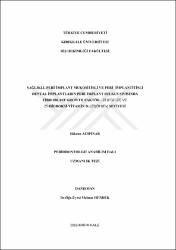Sağlıklı, peri-implant mukositisli ve peri-implantitisli dental implantların peri-implant sulkus sıvısında fibroblast growth faktör-23 (FGF-23) ve 25-hidroksi-vitamin D? (25(OH)D?) seviyesi
Özet
Dental implantlar diş eksikliğine bağlı estetik ve fonksiyonel kayıpların rehabilitasyonunu, restorasyonunu sağlamak amacıyla 1960 yıllarından beri uygulanmaktadır. Peri-implant hastalıklar dental implantlarda primer etiyolojik faktör olan bakteriyel biyofilme karşı oluşan enflamatuvar hastalıklardır. Peri-implant mukositiste yalnızca dental implant etrafındaki yumuşak dokuda enflamasyon bulguları; peri-implantitiste de bu bulgulara ek olarak implantı destekleyen alveoler kemikte kayıp olması gerekmektedir. Fibroblast büyüme faktörü-23 (FGF-23), kemik hücreleri tarafından salınan temel fizyolojik rolleri bulunan peptit yapılı bir hormondur. FGF-23 mineral metabolizmasına katılan sistemik hormonları ve ekstrasellüler matriksin mineralizasyonunu düzenleyen lokal kemik türevli faktörleri içeren kompleks endokrin ağlarda merkezi bir rol oynamaktadır. FGF-23'ün temel rolü, fosfat dengesini sağlaması ve 25-hidroksi-vitamin D? (25(OH)D?) degradasyonundaki artış ve aktivasyonundaki azalma ile dolaşımdaki 1,25-dihidroksi-vitamin D? konsantrasyonunu azaltmasıdır. D vitamini kalsiyum fosfat homeostazını ve mineral kemik metabolizmasını düzenleyen yağda çözünen bir hormondur. Bu vitamin, osteoblastlardan kemik matriks üretimini stimüle edebilir ve kemik remodeling sürecini optimize eder. D vitamininin karaciğerde hidroksilasyona uğrayan formu 25(OH)D? dolaşımda en fazla bulunan D vitaminidir. Bu kontrollü kesitsel klinik çalışmanın amacı; sağlıklı (n=30), peri-implant mukositisli (n=30) ve peri-implantitisli (n=30) dental implantların peri-implant sulkus sıvısında (PİSS) FGF-23 ve 25(OH)D? seviyesini değerlendirmektir. Çalışmada, klinik parametreler olarak sondlama derinliği (SD), klinik ataşman seviyesi (KAS), supurasyon (S), modifiye plak indeksi (mPİ), gingival indeks (Gİ), modifiye sulkus kanama indeksi (mSKİ), keratinize mukoza genişliği (KM) kaydedildi ve peri-implant sulkus sıvısı (PİSS) alındı. FGF-23 ile 25(OH)D? seviyeleri enzim bağlı immünosorbent analiz (ELİSA) ile analiz edildi. SD, KAS, mPİ, Gİ, mSKİ ve PİSS hacmi değerleri peri-implantitis grubunda peri-implant sağlık ve peri-implant mukositis grubundan, peri-implant mukositis grubundaki değerler de peri-implant sağlık grubundan istatistiksel olarak anlamlı düzeyde fazlaydı. S varlığı ve KM gruplar arasında istatistiksel olarak anlamlı fark gösterdi. S varlığı peri-implantitis grubunda diğer iki gruba göre istatistiksel olarak anlamlı düzeyde yüksekti. KM ise peri-implantitis grubunda diğer iki gruba göre istatistiksel olarak anlamlı düzeyde az belirlendi. PİSS'de değerlendirilen 25(OH)D? vitamini değerleri sağlıktan hastalığa geçişte istatistiksel olarak anlamlı azalma gösterirken, FGF-23 değerleri için istatistiksel olarak anlamlı bir fark bulunmadı. 25(OH)D? vitamini seviyeleri KAS, SD, mPİ, S, Gİ, mSKİ ile istatistiksel olarak anlamlı negatif korele ve FGF-23 ile pozitif, istatistiksel olarak önemsenmeyecek düzeyde düşük korele bulundu. Sonuç olarak; peri-implant sağlıktan hastalığa geçişte 25(OH)D? yeni bir teröpatik hedef olabilir. Peri-implant hastalıklarda 25(OH)D? ve FGF-23'ün rolünü daha iyi anlamak için daha fazla araştırma yapılması gerekmektedir. Anahtar Sözcükler: 25-hidroksi-vitamin D?, fibroblast growth faktör-23, peri-implant mukositis, peri-implant sulkus sıvısı, peri-implantitis. Dental implants have been applied since 1960 to provide rehabilitation and restoration of aesthetic and functional defects due to tooth deficiency. Peri-implant diseases are inflammatory diseases that arise against bacterial biofilm, which is the primary etiological factor in dental implants. Peri-implant mucositis may be identified as inflammation in the soft tissue around the dental implant. Peri-implantitis may be also identified as alveoler bone loss around the dental implant in addition to inflammation of soft tissue. Fibroblast growth factor- 23 (FGF-23) is a peptide-structured hormone with essential physiological roles released by bone cells. FGF-23 plays a central role in complex endocrine networks involving local bone-derived factors that regulate mineralization of extracellular matrix and systemic hormones involved in mineral metabolism. The main role of FGF-23 is to provide phosphate balance and to decrease circulating 1,25-dihydroxy-vitamin D? concentrations through a decrease in the activation and an increase in the degradation of 25-hydroxy-vitamin D? (25(OH)D?). Vitamin D is a fat-soluble hormone that regulates calcium phosphate homeostasis and mineral bone metabolism. This vitamin can stimulate bone matrix production from osteoblasts and optimize the bone remodeling process. 25(OH)D?, which is the form of vitamin D that undergoes hydroxylation in the liver, is the most commonly found vitamin D in circulation. This controlled cross-sectional clinical study aimed to evaluate the level of FGF-23 and 25(OH)D? in peri-implant sulcus fluid (PISF) of dental implants with healthy (n=30), peri-implant mucositis (n=30) and peri-implantitis (n=30). In the study, probing depth (PD), clinical attachment level (CAL), suppuration (S), modified plaque index (mPI), gingival index (GI), modified sulcus bleeding index (mSBI), keratinized mucosa width (KMW) were recorded as clinical parameters and PISF was obtained. The FGF-23 and 25(OH)D? levels were analyzed by enzyme-linked immunosorbent assay (ELISA). PD, CAL, mPI, GI, mSBI and PISF volume values were statistically different among groups. These clinical parameters were significantly higher in the peri-implantitis group than the peri-implant health and peri-implant mucositis groups, and these values in the peri-implant mucositis group were statistically significantly higher than the peri-implant health group. The presence of S and KMW parameters showed a statistically significant difference among the groups. S was significantly higher in the peri-implantitis group than the other two groups. KMW was significantly lower in the peri-implantitis group than the other two groups. PISF 25(OH)D? levels were significantly lower in the peri-implantitis group than the peri-implant health and peri-implant mucositis groups whereas there was no statistically significant difference for FGF-23 values among groups. 25(OH)D? levels were significant negatively correlated with CAL, PD, mPI, S, GI, mSBI and were found to be positively and statistically negligible level correlated with FGF-23. As a result; it was demonstrated 25(OH)D? may be a new therapeutic target from peri-implant health to disease. Further researchs are needed to better understand the role of 25(OH)D? and FGF-23 in peri-implant diseases. Keywords: 25-hydroxy-vitamin D?, fibroblast growth factor-23, peri-implant mucositis, peri-implant sulcus fluid, peri-implantitis.
















